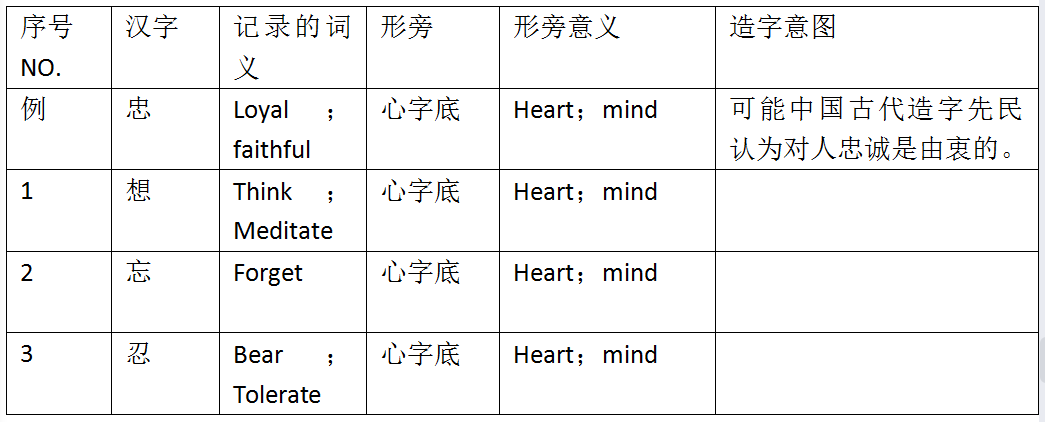以字带路
When Chinese character
meets the Silk Road
致力于汉字文化的海外推广
第六讲

恕[shù]
Being Considerate and Forgiveness
“恕”的释义
“恕”的基本含义是推己及人、将心比心。人可以根据自身对于厌恶之事的感受去理解、体贴他人的意愿。基于这种对他人的理解,人应避免将自己厌恶之事强加于他人,这即是“恕”。在执法者或受伤害者面对有过之人的情境中,“恕”被引申为宽恕、赦免之义。
The basic meaning of the term is to put oneself in another person’s position and have empathy, and to reflect what one would do in the same kind of situation. Starting out from their own likes and dislikes, people can understand and show considerations for the wishes of others, and on the basis of such understanding, people should refrain from imposing their own likes and dislikes on others. This is what it means to be considerate. To those enforcing the law and to the victims of wrongdoing, the meaning of the term extended to mean forgiveness or pardon.
解读“恕”字

“恕”的字形

金文「㣽」

小篆

楷书

恕的笔画
“恕”的基本含义是推己及人、将心比心。人可以根据自身对于厌恶之事的感受去理解、体贴他人的意愿。基于这种对他人的理解,人应避免将自己厌恶之事强加于他人,这即是“恕”。在执法者或受伤害者面对有过之人的情境中,“恕”被引申为宽恕、赦免之义。
The basic meaning of the term is to put oneself in another person’s position and have empathy, and to reflect what one would do in the same kind of situation. Starting out from their own likes and dislikes, people can understand and show considerations for the wishes of others, and on the basis of such understanding, people should refrain from imposing their own likes and dislikes on others. This is what it means to be considerate. To those enforcing the law and to the victims of wrongdoing, the meaning of the term extended to mean forgiveness or pardon.
常用词:
表示原谅,宽容:~罪。宽~。饶~。
表示客套,请对方不要计较:~我直言。~不奉陪。
表示以自己的心推想别人的心:~道。忠~。
交际用语:
①他犯了一个不可饶恕的错误。
He made an unpardonable mistake.
②恕我直言,你刚刚说的话里有个错误。
With all due respect, there was a mistake in what you said just now.
③做人得讲恕道,得饶人处且饶人。
A manshpuld be tolerant, and be lenient wherever it is possible.
如何正确理解中国文化中的“恕”(恕道)?
关于恕,在《论语·卫灵公》中有这样一段意味深长的对话:
子贡问曰:“有一言而可以终身行之者乎?”子曰:“其恕乎!己所不欲,勿施于人。”(子贡问道:“有没有一句教导可以让我终身奉行呢?”孔子说:“那就是恕吧! 自己不想要的,不要施加于他人。”)
As for “Shu”, there is a meaningful dialogue in the Analects of Confucius:
Zigong asked, “Is there any teaching that can serve as a lasting principle for conduct in one’s whole life?” Confucius replied, “Surely that is to be considerate! Do not do to others what you do not want others to do to you.” (The Analects)
可以看到,孔子在说出“恕”后,接着以“己所不欲,勿施于人”8字对恕进行了进一步的解释与说明,在孔子的眼中,恕道是可以让人终身奉行,用以慎独的一个字,是以自己的心意推测、理解别人的心意,亦即今之所谓设身处地,换位思考。
As you can see, after Confucius saying “Being considerate”, he uses “Don’t do to others what you don’t want others to do to you.” to explain its meaning deeply.In his opinion,“ forgiveness” can be the pursuit of the whole life,while reminding people to keep self-controlling.It’s using your own mind to understand the mind of others, which is what we call putting ourselves in other people’s shoes.
个人可以用恕道进行自我审视,而在国际交往中,国家也一直在贯彻着恕道,将心比心,推己及人,中国始终尊重不同民族和国家的差异性,尊重他们的合法权益,同时,也捍卫着本国的基本权利。习近平总书记曾强调,中国人民崇尚“己所不欲,勿施于人”,中国不认同“国强必霸”,这些亲诚惠容的理念,都是恕道在当代中国的表现。
Individuals can use the Dharma to conduct self-examination. In international exchanges, China has always been comparing ourselves with others. China has always respected the differences of different ethnic groups and countries and their legitimate rights and interests. At the same time, China has always defended its basic rights. General Secretary Xi Jinping once stressed that the Chinese people believe that “do not do to others what you do not want others to do to you”, and China does not believe that “a strong country is bound to seek hegemony”. These principles of amity, sincerity, mutual benefit and inclusiveness are all manifestations of the doctrine of forgiveness in contemporary China.
欣赏·黄梅戏《六尺巷》
“
黄梅戏《六尺巷》讲了这样一个与恕道有关的故事:
The Huangmei Opera Six Feet Alley tells a story about forgiveness:
清康熙年间,张英担任文华殿大学士兼礼部尚书。他老家桐城的官邸与吴家为邻,两家院落之间有条巷子,供双方出入使用。后来吴家要建新房,想占这条路,张家人不同意。双方争执不下,将官司打到当地县衙。县官考虑到两家人都是名门望族,不敢轻易了断。
During the reign of Emperor Kangxi of the Qing Dynasty, Zhang Ying served as the grand master of the Hall and the book of Rites. His official residence in tongcheng, his hometown, was next door to the Wu family, and there was an alley between the two courtyards for both sides to use. Later, when the Wu family wanted to build a new house and occupied the road, the Zhangs disagreed. The two sides could not settle the dispute and took the case to the local county government. Considering that the two families are famous families, the magistrate did not dare to terminate the case easily.
这时,张家人一气之下写封加急信送给张英,要求他出面解决。张英看了信后,认为应该谦让邻里,他在给家里的回信中写了四句话:“千里来书只为墙,让他三尺又何妨?万里长城今犹在,不见当年秦始皇。”家人阅罢,明白其中含义,主动让出三尺空地。吴家见状,深受感动,也主动让出三尺房基地,“六尺巷”由此得名。
At this time, zhang’s family wrote an urgent letter to Zhang Ying in anger, asking him to solve the problem. After reading the letter, Zhang Ying thought he should be humble to his neighbors. He wrote four sentences in his reply to his family: .”Sending a letter through thousand miles just for a wall,but what if let he gets three feet?We can still see the Great Wall, but The First Emperor of Qin has gone.” His family understand the meaning, taking the initiative to give up three feet of space. Wu was deeply moved, also took the initiative to give up three feet house base, That’s the source of the Six Foot Alley’s name.
”
“恕”的意义与“心”有关系,这体现了中国古代先民造字、构字的智慧。你能根据汉字所记录的词义及其形旁“心”,分析出中国古代人的造字意图吗?

图文编辑 | 李烨-Elivia、关聿彤-Clement
赵英同-Yingtong Zhao
指导教师 | 高亚楠-Gloria、刘宏飞-Victor
